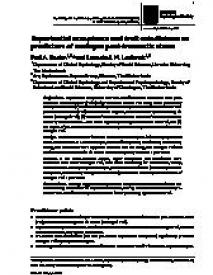Experiential acceptance and trait-mindfulness as predictors of analogue post-traumatic stress
Abstract
Objectives
Experiential acceptance and trait‐mindfulness are associated with post‐traumatic stress disorder (PTSD) after traumatic events. This study was a preliminary attempt to examine (1) associations of experiential acceptance and trait‐mindfulness with post‐traumatic stress (PTS) associated with negative, but not necessarily traumatizing, life events (‘analogue’ PTS), (2) the role of these variables in the context of neuroticism as well as worry and rumination – two other regulatory strategies associated with PTS, and (3) the impact of pre‐trauma tendencies towards experiential acceptance and mindfulness on analogue PTS.
Design
Data were obtained from two distinct student samples. A first sample provided cross‐sectional data. In a second sample, indices of acceptance, mindfulness, neuroticism, worry, and rumination were tapped at inclusion into the study, and analogue PTS and confrontation with stressful life events were subsequently assessed 1 year later.
Results
In the cross‐sectional sample, higher acceptance and mindfulness were associated with lower analogue PTS, even when controlling for neuroticism, worry, and rumination. In the prospective sample, pre‐trauma mindfulness (but not experiential acceptance, neuroticism, worry, and rumination) assessed at baseline predicted levels of analogue PTS 1 year later.
Conclusions
Findings suggest that experiential acceptance and trait‐mindfulness are incrementally related to PTS beyond neuroticism, worry, and rumination and that pre‐trauma trait‐mindfulness may be a resilience factor protecting against severe PTS.
Practitioner points
We examined associations of experiential acceptance and trait‐mindfulness with post‐traumatic stress (PTS) associated with negative life events (‘analogue’ PTS).
Experiential acceptance and trait‐mindfulness were associated with concurrent analogue PTS, over and above neuroticism, worry, and rumination.
Pre‐trauma trait‐mindfulness (but not pre‐trauma experiential acceptance) significantly predicted analogue PTS in prospective analyses.
Enhancing mindfulness skills could be a useful tool to reduce the risk of PTS in trauma‐exposed samples.
Geachte bezoeker,
De informatie die u nu opvraagt, kan door psychotraumanet niet aan u worden getoond. Dit kan verschillende redenen hebben,
waarvan (bescherming van het) auteursrecht de meeste voorkomende is. Wanneer het mogelijk is om u door te verwijzen naar de bron
van deze informatie, dan ziet u hier onder een link naar die plek.
Als er geen link staat, kunt u contact opnemen met de bibliotheek,
die u verder op weg kan helpen.
Met vriendelijke groet,
Het psychotraumanet-team.
In: Psychology and Psychotherapy: Theory, Research and Practice, ISSN 1476-0835 | 91 | 1 | March | 1-14
https://onlinelibrary.wiley.com/doi/epdf/10.1111/papt.12138


